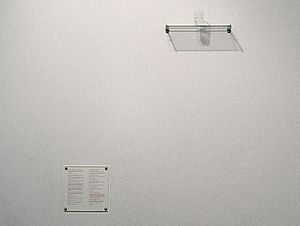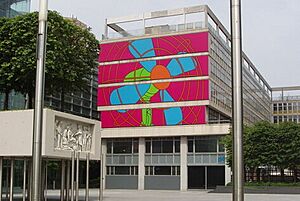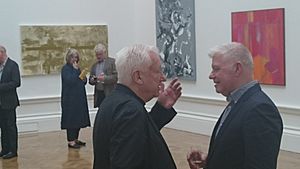Michael Craig-Martin facts for kids
Quick facts for kids
Sir Michael Craig-Martin
|
|
|---|---|
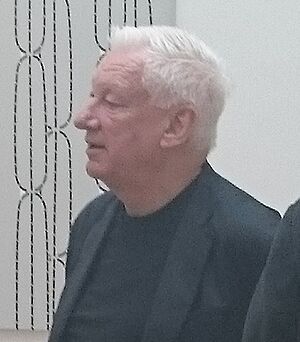
Michael Craig-Martin in 2015
|
|
| Born | 28 August 1941 Dublin, Ireland
|
| Nationality |
|
| Education | Yale University |
| Known for |
|
|
Notable work
|
An Oak Tree |
| Movement | Conceptualism |
Sir Michael Craig-Martin (born August 28, 1941) is an artist and painter from Ireland. He is known for his modern and conceptual art. He's famous for teaching and supporting many young British artists, and for his artwork called An Oak Tree. He is a retired professor of art at Goldsmiths. He also wrote a book called On Being An Artist in 2015, sharing advice for new artists.
Contents
Early Life and Art Journey
Michael Craig-Martin was born in Dublin, Ireland. He spent most of his childhood in Washington, D.C., USA. He went to a Catholic primary school and then to a Benedictine school. At these schools, he saw many religious pictures in stained-glass windows, which sparked his interest in art. One of the priests, who was an artist, also helped him get interested in art. He was also very impressed by paintings from Mark Rothko at the Phillips Collection.
Studying Art Around the World
Craig-Martin studied in Bogotá, Colombia, for a while. There, drawing classes with an artist named Antonio Roda helped him see art in new ways. His parents weren't very artistic, but they did have a painting by Picasso in their home. Back in Washington, he took more drawing classes. In 1959, he went to Fordham University in New York to study English and History, and he also started painting.
In 1961, Craig-Martin studied art in Paris, France. Later that year, he started a painting course at Yale University in the USA. The teaching there was greatly influenced by Josef Albers, who taught about color and shapes. Craig-Martin later said that everything he knows about color came from that course. Famous artists like Alex Katz and Al Held were some of his teachers.
Michael Craig-Martin's Artworks
Michael Craig-Martin has lived and worked in London since 1966. At first, in the late 1960s, he made art using box-like structures. Then, he started using everyday objects in his art. In the late 1970s, he began making simple line drawings of common items. Over the years, he built up a large collection of these images, which he still uses today.
In the 1990s, he started focusing more on painting. He used the same bold outlines and bright colors for his paintings on canvas. He also created complex wall paintings in galleries.
The Famous An Oak Tree
One of his most well-known artworks is An Oak Tree, which he showed in 1973. This artwork is a simple glass of water placed on a shelf on a gallery wall. Next to it, there's a written text that explains why the glass of water is actually an oak tree. It's a conceptual piece, meaning the idea behind it is more important than the object itself.
Once, when the artwork was being sent to Australia, customs officials stopped it because they thought it was a plant. Craig-Martin had to explain that it was really just a glass of water! The National Gallery of Australia bought the artwork in 1977, and the Tate gallery also has a copy made by the artist.
Helping Young British Artists
From 1973, Craig-Martin taught at Goldsmiths College. In the 1980s, he had a big influence on a group of artists who became known as the Young British Artists (YBAs). One of these artists was Damien Hirst. Craig-Martin also helped promote an important art show called Freeze to people in the art world.
In 1995, he organized a large exhibition called Drawing the Line. This show traveled around London and explored the history of line drawing. Craig-Martin's influence on British art has been written about in newspapers. He has also been a trustee for the Tate Gallery and the National Art Collections Fund.
Recent Artworks
Since 2011, Craig-Martin has been creating sculptures from powder-coated steel. These sculptures look like line drawings floating in the air, showing everyday objects. The first series of these sculptures was shown in the gardens of Chatsworth House in 2014.
Art Exhibitions

Michael Craig-Martin had his first solo art show in London in 1969. Since then, he has regularly shown his art in the UK and other countries. He represented Britain at the São Paulo Art Biennial in 1998. His solo museum exhibitions include shows in Germany, Portugal, and Austria. He also had his first American show at the Museum of Modern Art in New York.
In 1989, a special exhibition looking back at Craig-Martin's work was held at the Whitechapel Gallery in London. In 2006, the Irish Museum of Modern Art held a large exhibition called "Michael Craig-Martin: Works 1964–2006." This show featured about 50 of his paintings, sculptures, wall drawings, and other art pieces from over 40 years of his career. One of his works, On the Table (1970), showed four metal buckets hanging on a table. This piece showed how much he was influenced by Minimalism and Conceptualism. His work An Oak Tree (1973) is seen as a very important moment in the history of conceptual art.
In 2015, Craig-Martin's exhibition "Transience" at the Serpentine Galleries showed artworks from 1981 to 2015. These included pictures of old technology like laptops, game consoles, and old televisions. This highlighted how quickly technology changes. In the same year, Craig-Martin helped organize the Royal Academy Summer Exhibition, inviting many artists from his generation. In 2024, a new exhibition looking back at his work opened at the Royal Academy in London.
Art Collections
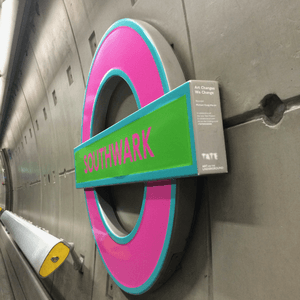
Michael Craig-Martin's art can be found in public art collections all over the world. Some of these places include:
- Australian National Gallery, Canberra, Australia
- Centre Georges Pompidou, Paris, France
- Irish Museum of Modern Art, Dublin, Ireland
- Arts Council of Great Britain, United Kingdom
- Tate, London, United Kingdom
- Museum of Modern Art, New York, USA
- Yale Center for British Art, Connecticut, USA
About His Life
Michael Craig-Martin married Jann Hashey in 1963. They had a daughter named Jessica Craig-Martin, who is now a photographer. Their marriage ended in 1976. Craig-Martin was honored with the title of Commander of the Order of the British Empire (CBE) in 2001. He was made a knight in 2016 for his contributions to art, which means he can be called "Sir."
See also
 In Spanish: Michael Craig-Martin para niños
In Spanish: Michael Craig-Martin para niños
- What Do Artists Do All Day?
 | Toni Morrison |
 | Barack Obama |
 | Martin Luther King Jr. |
 | Ralph Bunche |


